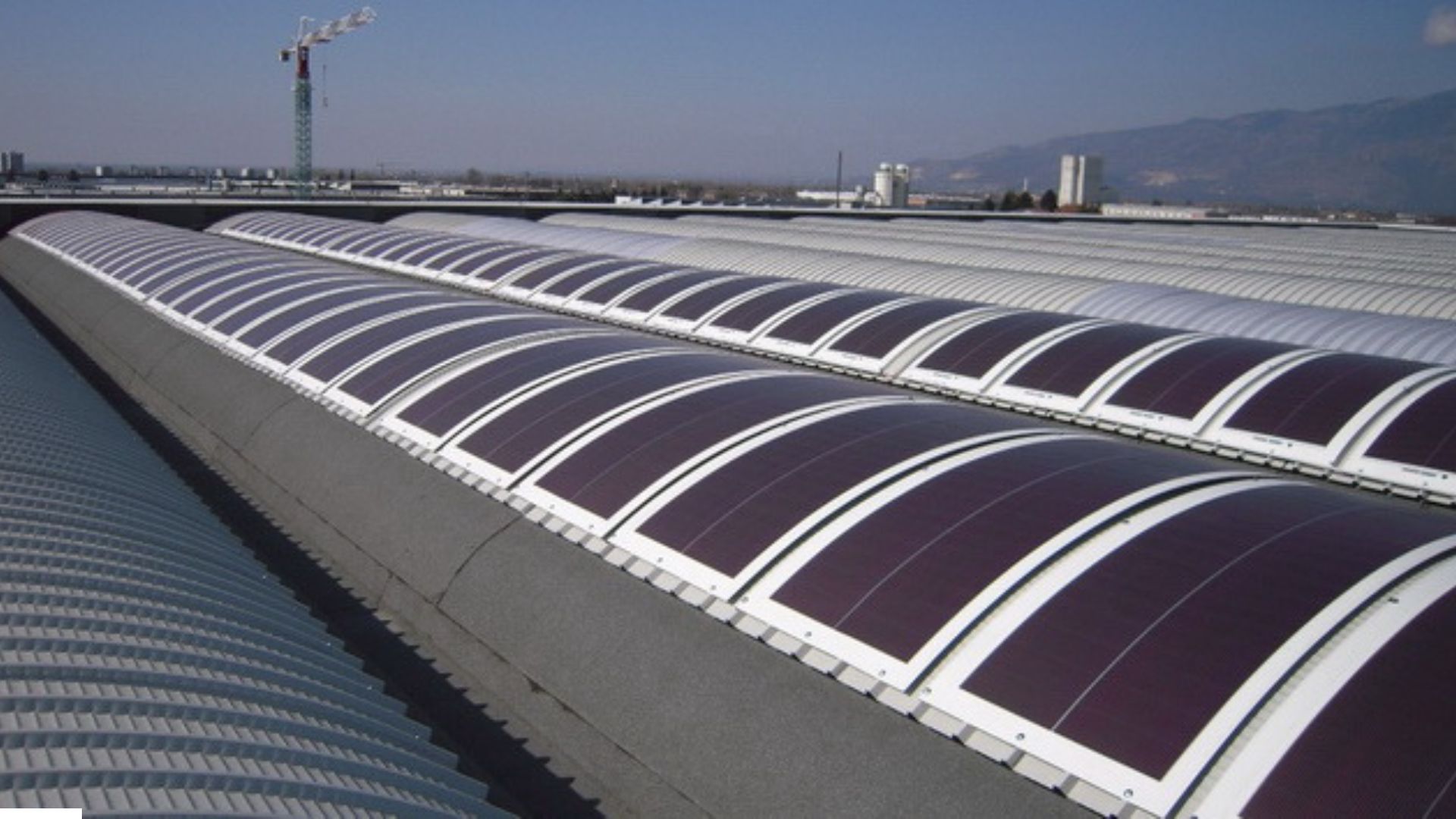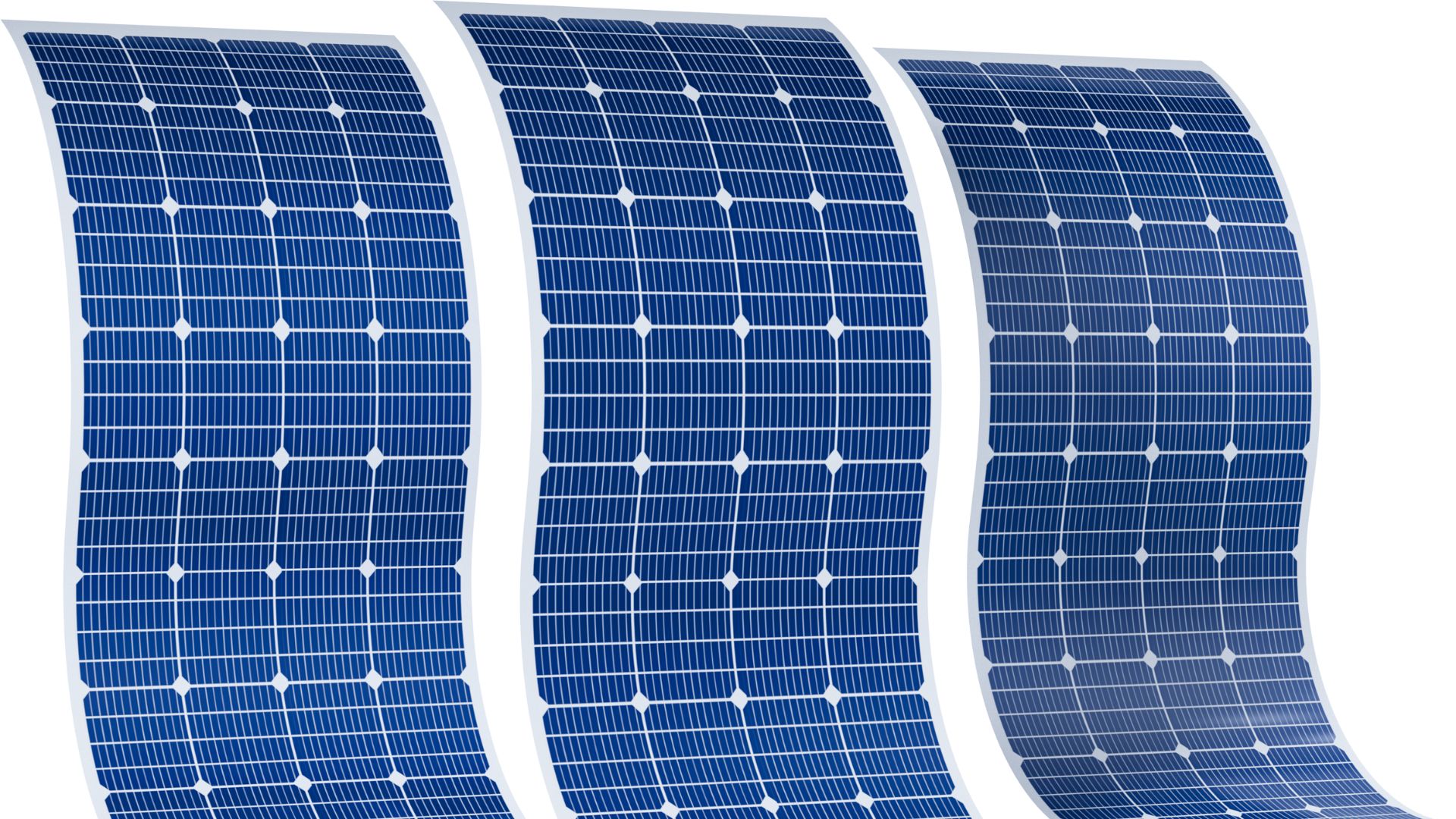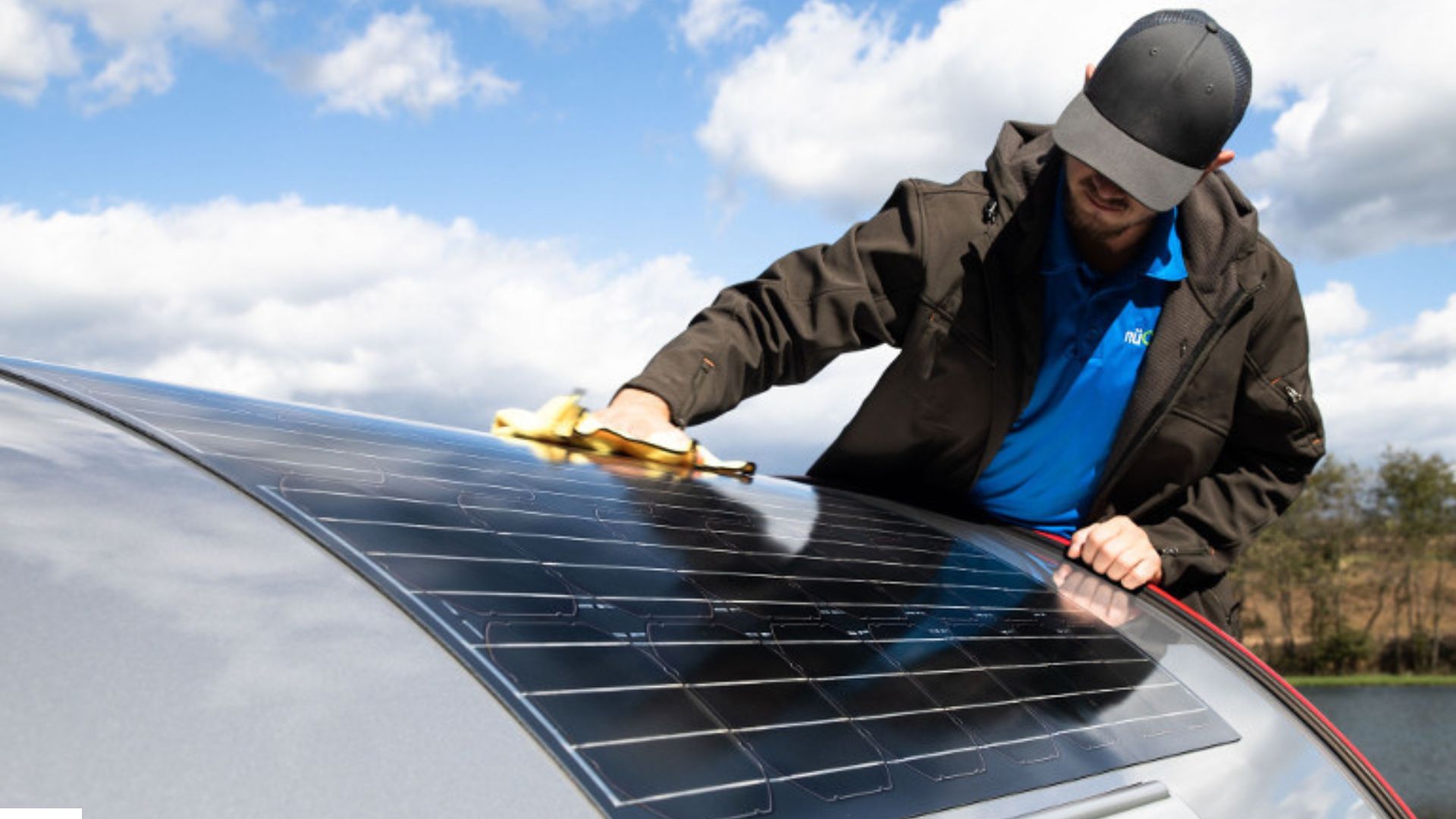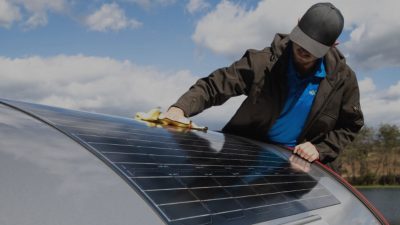Flexible solar panels offer a revolutionary approach to overcoming structural hurdles. Unlike their rigid counterparts, flexible solar panels are lightweight and can be seamlessly integrated onto various surfaces, including curved and uneven ones. This adaptability allows industrial facilities to transform previously unusable spaces into productive energy-generating areas.
Industrial facilities often struggle with space constraints and the logistical challenges of installing traditional solar panels. Roof structures, facades, and other surfaces may not support the weight and rigidity of conventional panels, leading to underutilization of potential solar energy resources.

What Makes Flexible Solar Panels Different?
Flexible solar panels stand out from their rigid counterparts due to their unique construction and technology. These panels are primarily made using thin-film photovoltaics, which involves depositing one or more layers of photovoltaic material onto a substrate. The materials commonly used include amorphous silicon, cadmium telluride, and copper indium gallium selenide (CIGS). This technology allows the panels to be lightweight, thin, and, most importantly, flexible.
The core benefits of flexibility include:
- Versatility in Installation: Flexible panels can be installed on curved or uneven surfaces, making them ideal for a variety of industrial applications where traditional rigid panels might not fit.
- Lightweight Nature: Their lightweight nature reduces the structural load on buildings, which is particularly advantageous for older structures or those with specific weight limitations.
- Durability: These panels are generally more resistant to impacts and can withstand harsh environmental conditions better than their rigid counterparts.
While flexible solar panels may have slightly lower efficiency rates compared to traditional silicon-based rigid panels, advancements in thin-film technology are continually closing this gap. The trade-off between efficiency and flexibility often makes these panels a more suitable choice for certain industrial applications.
Semi-flexible vs Monocrystalline panels
- Monocrystalline panels: They boast high efficiency and are ideal for industries aiming for maximum energy capture with minimal spatial footprint.
- Semi-flexible panels: These offer a robust alternative, able to withstand moderate physical stress, making them suitable for dynamic industrial environments.
While they share the same photovoltaic principles as traditional panels, their uniqueness lies in their versatility. This allows flexible solar panel markets to cater to a diverse array of industrial needs with a touch of innovation.

Advantages of Flexible Solar Panels for Industrial Applications
The industrial landscape is embracing the adaptability and innovation of flexible solar panels, championing a sustainable energy revolution. These panels, including semi-flexible solar panels, offer a multitude of benefits tailored for industrial use.
- Versatility: Flexible solar panels are quite pliable, conforming to a variety of forms typical in industrial surface applications, from flat, like the warehouse rooftop, to contour, like the curvatures of machinery or vehicles. This unlocks the potential of solar energy that was problematic or impracticable in locations hosting rigid solar.
- Space-Efficient: Industries that faced severe space constraints can now look to these panels, as they can be mounted within the existing architecture to harness energy most efficiently without consuming any additional space.
- Easy to install: Installation processes are fast and do not take time because the lightweight competitors are more flexible and can fit onto curved or rough surfaces. This significantly reduces installation time and costs, which could mean music to an industry’s bottom line.
- Durability: Flexible solar panels are designed to withstand the harshness of industrial work environments. Thus, they can maintain their efficiency and structural integrity even under the harshest conditions, which is why their popularity grows in every sector that demands this kind of durability.
This has seen industries adopt these solar monster solutions rapidly because they offer immediate financial benefits and long-term benefits to environmental sustainability. How long flexible solar panels last can be answered by considering their durability compared to rigid ones. Additionally, there are straight user-friendly guides on how to install flexible solar panels, incrementally supporting self-sufficiency in matters of energy, which contributes to a greener industrial future.
How Does This Application Vary Between Industries
Manufacturing and Warehouses
Flexible solar panels are particularly well-suited for manufacturing plants and warehouses, which often feature large, irregular rooftops. These rooftops can pose challenges for traditional rigid panels due to their weight and the need for structural reinforcement. Flexible solar panels, being lightweight and adaptable, can be installed on a variety of surfaces without extensive modifications. This allows industrial facilities to maximize their roof space for energy production, reducing electricity costs and enhancing sustainability.
Transportation and Logistics
In the transportation and logistics sector, flexible solar panels can be integrated into the roofs of delivery vehicles, trucks, and trailers. This integration provides a mobile power source, reducing reliance on fossil fuels and decreasing operational costs. For instance, delivery trucks equipped with flexible solar panels can use solar energy to power refrigeration units or auxiliary systems, reducing fuel consumption and emissions. The flexibility of these panels also ensures they can conform to the curved surfaces of vehicles without compromising aerodynamic performance.
Agriculture and Remote Operations
Flexible solar panels offer a versatile and reliable energy solution for agricultural operations, especially those located in remote areas. They can be placed on irregularly shaped buildings, greenhouses, or even directly on the ground. This adaptability is crucial for powering irrigation systems, lighting, and other essential equipment in areas where access to the electrical grid is limited or non-existent. By harnessing solar energy, farmers can reduce their dependence on diesel generators, lowering operational costs and minimizing environmental impact.
Oil, Gas, and Mining Industries
The oil, gas, and mining industries often operate in remote and harsh environments where access to the electrical grid is either limited or unavailable. Flexible solar panels can be deployed in these challenging locations, providing a sustainable power source for machinery, living quarters, and communication systems. Their durability and ability to withstand extreme conditions make them an ideal choice for such applications. Additionally, the use of solar energy in these industries can reduce the reliance on diesel generators, lowering both operational costs and carbon emissions.
Flexible solar panels are revolutionizing industrial applications by providing adaptable, cost-effective, and sustainable energy solutions. Their unique properties allow them to be utilized in diverse environments, from the rooftops of warehouses to the remote fields of agricultural operations, highlighting their potential to drive energy efficiency and sustainability across various sectors.
Economic and Environmental Advantages

Cost Reduction
One of the most significant economic advantages of flexible solar panels is their potential for cost reduction. Due to their lightweight nature, flexible panels require less structural support and can often be installed without the need for extensive modifications or reinforcement. This translates into lower installation costs compared to traditional rigid panels. Additionally, the ease of transport and handling reduces labor costs and logistics expenses, making them panels a financially attractive option for large-scale industrial projects.
Environmental Impact
These panels have a smaller environmental footprint compared to traditional panels. The manufacturing process for flexible panels typically requires fewer raw materials and generates less waste. By reducing the dependence on fossil fuels, these panels contribute to a decrease in greenhouse gas emissions and other pollutants. Their use in various industries supports the transition towards cleaner, renewable energy sources, helping to mitigate climate change and promote environmental sustainability.
Longevity and Durability
Despite their lightweight and flexible design, these solar panels are built to be durable and long-lasting. They are capable of withstanding harsh environmental conditions, including extreme temperatures, heavy winds, and physical impacts. This durability ensures a longer lifespan, reducing the need for frequent replacements and contributing to long-term cost savings. The ability to maintain performance under challenging conditions makes them panels a reliable energy solution for industrial applications.
Additional Advantages
They offer several other benefits that enhance both economic and environmental outcomes. Their unobtrusive design allows them to be integrated seamlessly into existing structures, preserving the aesthetic and functional aspects of industrial facilities. They also provide energy independence, reducing the reliance on grid electricity and protecting businesses from energy price fluctuations. Furthermore, the adaptability of flexible panels enables their use in a variety of applications, maximizing the potential for renewable energy adoption across different sectors.
Installation and Maintenance of Flexible Solar Panels
Installing flexible solar panels is easy, thanks to their ability to fit different industrial surfaces. Here’s a simple guide to help you make the most of solar power:
- Choose the Best Spot: Find a location that gets plenty of sunlight and has no major obstructions.
- Clean the Surface: Make sure the surface is clean and free of debris to help the panels stick better.
- Attach the Panels: Use adhesive or mounting brackets, depending on the surface and the type of panel.
- Connect to Power: Securely connect the panels to your power system, making sure the wiring is safe and waterproof.
Regular maintenance is key to keeping your investment in good shape. Clean the panels regularly to remove any dirt or materials that might block sunlight. Although flexible panels are more durable than rigid ones, it’s still important to check for any signs of wear and tear. Additionally, having a professional check the system periodically can ensure everything is working well. Some manufacturers even offer professional installation services, which can be very helpful for industrial uses.
The lifespan of your semi-flexible solar panels depends on how well you maintain them. Regular care will help you get the most out of this innovative technology.

The Future is Flexible: Embrace Solar Innovation Today
The growing importance of renewable energy in the industrial sector cannot be overstated. Flexible solar panels represent a significant advancement in solar technology, offering unique advantages in terms of versatility, installation, and durability. They open up new possibilities for sustainable energy solutions in various industrial applications, from permanent installations on complex roof structures to temporary setups at construction sites.
Businesses should explore the potential of flexible solar panels as a viable option for their energy needs. The economic and environmental benefits, coupled with the ability to deploy these panels in diverse settings, make them a compelling choice for forward-thinking companies. Discover more about the benefits of solar panels and how they can be seamlessly incorporated into your business. ‘
Embracing this technology can enhance your operational efficiency and contribute to a greener, more sustainable future. Explore Evo Energy’s range of technologies for comprehensive solutions tailored to your industrial requirements.
